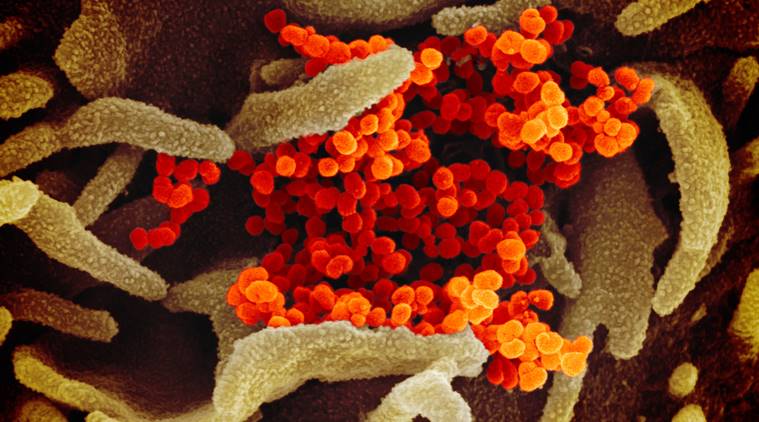 The scanning and transmission electron microscope images of the COVID-19 or coronavirus. (Credits: NIAID-RML)
The scanning and transmission electron microscope images of the COVID-19 or coronavirus. (Credits: NIAID-RML)
US-based Codagenix, a biotech firm developing vaccines, has partnered with Pune’s Serum Institute of India to rapidly develop a vaccine against the novel coronavirus (COVID-19), which has claimed over 1,600 lives across the world.
Adar Poonawalla, CEO of Serum Institute of India (SII), the world’s largest vaccine-manufacturer, told The Indian Express that the company has an algorithm, with which it has designed several coronavirus vaccine candidate genomes. “There are four candidates which will be tested in mice. Within three to four months, we will have animal data towards understanding the safety and efficacy of the vaccine… then it can be planned for testing in human clinical trials,” said Poonawalla.
The novel coronavirus genome was available in the public domain in a matter of days after the virus was first isolated. Due to open-source data sharing among scientists and public health agencies, Codagenix has designed multiple coronavirus vaccine candidate genomes using its proprietary deoptimisation technology. Now, the vaccine viruses will be grown and tested in vivo by laboratories suitable for containment prior to clinical trials.
Fast-tracking a vaccine was an effort to demonstrate to the world that vaccines could be engineered in a shorter time to respond to global epidemics, added Poonawalla. “Unlike the traditional method, this will save us three to four years of vaccine and strain development,” he said.
“… However, what attracted me to Codagenix is whether we can use such technology platforms to rapidly respond to epidemics. Developing a vaccine against coronavirus disease will be an acid test,” he said.
“The cost of developing the vaccine is estimated to be marginally lower than $10 million. but the basic aim is to demonstrate that we can engineer vaccines in a shorter time to be able to respond to emergencies,” said Poonawalla.
The SII would then scale up manufacturing of the vaccine. When asked about the vaccine being commercially viable, Poonawalla said it would have to be a ‘wait and watch’ situation.
“The vaccine developed against the H1N1 (swine flu) influenza virus had limited takers. In India, the adult population is not too keen on taking vaccines unless there is a huge fear and outbreak like situation,” he said.
“In case it is not commercially viable, we would look at partnering and selling the rights to a Chinese firm. Also, these vaccines would be stockpiled for two to three years by certain countries,” added Poonawalla.
“Time will tell if our effort was worth it but importantly, the aim is to establish this technology platform and use this method of reverse engineering and algorithm to make the vaccine. This can then be handy in the future in case there is an even deadlier outbreak,” he said.
In Maharashtra
Till February 18, a total of 39,784 travellers have been screened at Mumbai international airport, and 228 persons from Maharashtra have travelled to COVID-19-affected countries and returned, said a health department official.
From January 18 till date, 70 symptomatic travellers have been kept in isolation facilities. Till today, 66 samples sent by the state have tested negative as per the reports of National Institute of Virology, Pune. Currently, five travellers are still in hospitals in Maharashtra, three in Pune and two in Mumbai.